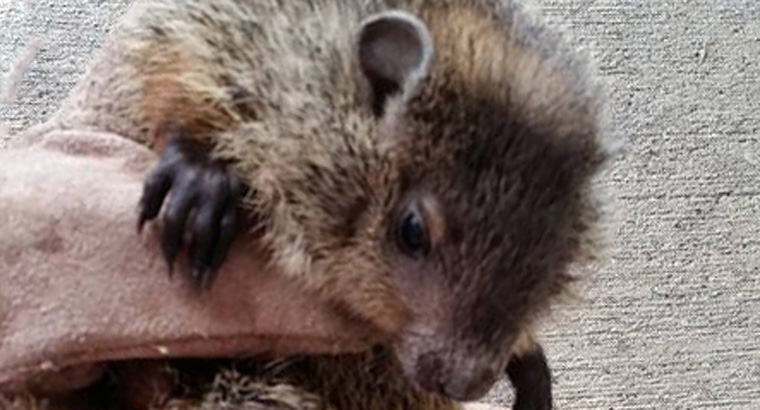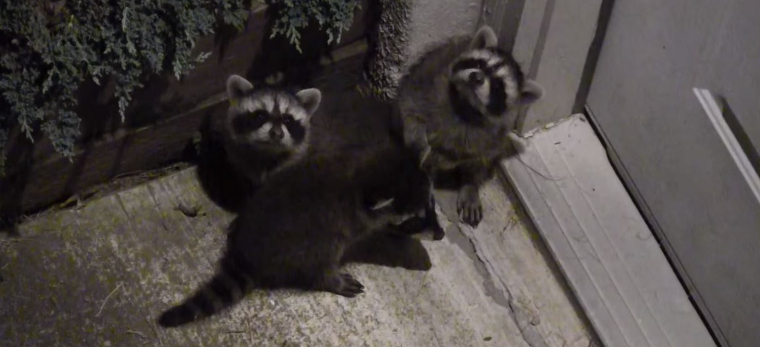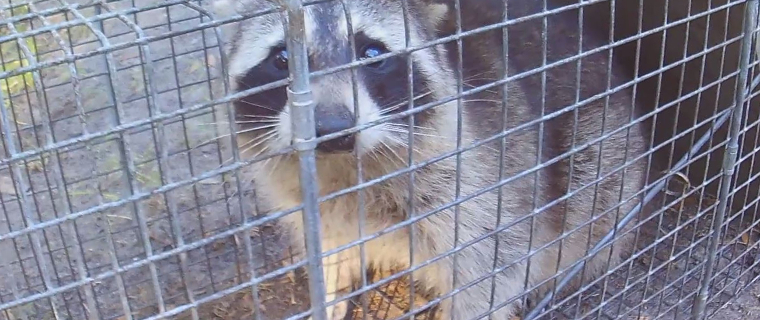-
info@aaanimalcontrol.com
Call us for help in your town
Humane Wildlife Education
Removing or Getting Rid of Raccoons Without Killing Them
Need raccoon removal in your hometown? We service over 500 USA locations! Click here to hire us in your town and check prices - updated for year 2020.
Raccoons are animals that can be a real nuisance
when they start regularly visiting your yard or
garden, or worse if they find a nesting spot in a
part of your property. They are creatures that can
cause a lot of problems, not only because of the
diseases and parasites that they can carry, but
also because of their scavenging for food which
can see them tearing through garbage bags, or even
getting into pet food sacks too. There are plenty
of reasons why you will not want to have a raccoon
in and around your property, so this is how you
can go about getting rid of a problem raccoon
without killing it.

Trapping And Removing A Raccoon
In order to be able to catch and remove a raccoon,
you will need to get a cage trap, which is of a
suitable size, and is often marketed as being
suitable for raccoons, feral cats and other
creatures of a similar size. This should then be
placed in an area where you know the raccoon has
been active, and where possible try to place the
trap using gloves, which will reduce the human
scent that is transferred to the trap. You can
then bait the trap with a food that will help draw
the raccoon in, and most people with experience of
trapping raccoons will use a food with quite a
strong smell such as tinned cat food, sardines or
crispy bacon.
Find out how big raccoons can get.
Precautions To Take When Moving And
Releasing A Raccoon
It is important to remember that raccoons can
carry parasites, and may try to give you a bite
when you are moving the trap, so make sure you
wear thick clothing and gloves, and put a blanket
over the trap before you move it. It is also worth
searching your property to find the raccoon’s
nest, as there may be baby raccoons that will need
to be moved at the same time, as you certainly
don’t want them to die and start decomposing in
your home. You should also think about laying a
tarpauling or other protection on the floor of the
vehicle you are using to transport the raccoon as
it may try to scratch through the cage.
Excluding A Raccoon From A Yard Or Garden
This is quite a difficult task as raccoons are
actually very good climbers, so will often be able
to get over many fences, but one approach is to
use a fence where the top foot is tilted outwards,
which should make it more difficult to climb over.
In truth, you will need a firm barrier such as a
fence to completely exclude a raccoon from a yard
or garden, but another option is to look at
removing factors that will attract raccoons. This
will mean dealing with food sources such as
securing garbage and pet food in solid containers,
and also making sure that any fallen fruit from
fruit trees is removed promptly.
Find out: Are raccoons dangerous to cats, dogs, or other pets?
Problems Caused By Raccoons
There are plenty of reasons why you should want to
get rid of raccoons, and one of the main ones is
that they can easily tear through garbage and
leave a lot of mess in the area. They can also
come into conflict with any pets which will often
be inquisitive, and may get scratched or bitten by
the raccoon, which can then transmit a disease to
your pet. Raccoons are also known for digging
holes in yards and gardens, and also making nests
in dark areas of properties, so there are plenty
of reasons that will encourage you to deal with a
raccoon problem quickly. For more information, you
may want to click on one of these guides that I
wrote:
Can You Kill Raccoons in Your Yard?
Need raccoon removal in your hometown? We service over 500 USA locations! Click here to hire us in your town and check prices- updated for year 2020.
In order to understand what you are and aren't allowed to do with pest raccoons, you must first understand the status of a raccoon in your state or local area. This will differ from place to place, with different laws and regulations. As well as changing from one place to another, you may also find that these regulations are subject to change from one year to the next too. In many cases, it depends on the population of that animal and the kind of damage it can cause and has the potentiel to cause in the future.

If you lived in the California, for example, you would find that raccoons are considered to be “fur-bearing” animals, which means that they are subject to all of the hunting laws for other fur-bearing animals. Throughout the year, there will be certain months or seasons dedicated to hunting raccoons, and as well as dictating how you can trap or destroy/dispose of the animal, there are also restrictions on how many animals you are permitted to trap, hunt, or destroy.
In places where raccoons pose a problem to residential or commercial buildings or has been damaging land or property, it is usually okay to remove that animal using “legal” ways. In California, this means that you will be granted permission to remove a raccoon from a property outside of hunting season, providing that animal has caused damage to your property and won't go away. However, it must also be noted that in California, you are not legally permitted to release a raccoon back into the wild unless you have received written permission from the local authorities, in this case, the California Department of Fish and Game.
Moving away from California and you'll find that the laws vary greatly. In Arizona, raccoons are actually protected by the state, which means that you are not permitted to trap or kill one. However, in this state, the law is a little odd. You are permitted to use a firearm at night to kill a raccoon, and it is only with the raccoon that you are allowed to do this. (We recommend seeking out an expert opinion from local authorities as the internet is filled with information that often conflicts itself.)
There are ways of killing raccoons in the yard, but finding the right way is going to be a long and complicated process, with plenty of twists and turns along the way. Your first port of call should be wildlife rehabilitators who usually have plenty of knowledge and experience to guide you. You could also try local authorities too — city or county animal control.
What Happens to Raccoons When Wildlife Rehabilitators Trap Them?
Need raccoon removal in your hometown? We service over 500 USA locations! Click here to hire us in your town and check prices- updated for year 2020.
There really isn't any good, quick, or easy way to answer this question, because the fate of the raccoon actually doesn't always lie in the hands of the wildlife rehabilitators that capture them. It seems almost a waste of time to go through all the effort of trapping an animal, only to have absolutely no control over what happens to it next, but that is usually the case with pest animals, and especially when those pest animals start to become a very real problem and a very dangerous threat.

In many states, you must destroy a raccoon that you have captured. This seems unjust, but when you then take into consideration that the states that insert these laws often have a high rabies problem, and raccoons are one of the biggest culprits as far as the spread of that dangerous disease is concerned.
Wildlife rehabilitators must abide by the law. They are usually licensed, insured, and have permits to allow them to do the job they do. All of this, put together, means that you get a service you can rely on. If something goes wrong, you are insured to cover it, but the animal control officer will have enough experience, education, and equipment to make sure that nothing goes wrong.
If it is legal for a wildlife rehabilitator to do so, he will do his namesake — rehabilitate the animal so that it can be released back into the wild again. This can't usually be done with raccoons, although in some states is permitted, but isn't an option for rabies-infected raccoons, or raccoons that are injured/sick with other conditions. In these cases, the kinder and most humane approach is to destroy the animal, which will always be done in a safe and humane way, ensuring that the animal feels very little pain. This isn't an option offered by many at-home remedies or DIY trapping approaches.
If the after-details are important to you, you shouldn't be worried about asking your wildlife control officer what they intend to do with the animal once they have successfully trapped it. We must warn you, however, that the answer you receive isn't always going to be the answer you were hoping for. Sadly, the law is the law; even wildlife rehabilitators, with all the good will in the world, can't do anything to change that.
How
much does raccoon removal cost? - get the
lowdown on prices.
How
to get rid of raccoons - my main raccoon
removal info guide.
Example
raccoon trapping photographs - get
do-it-yourself ideas.
Raccoon
job blog - learn from great examples of
raccoon jobs I've done.


















